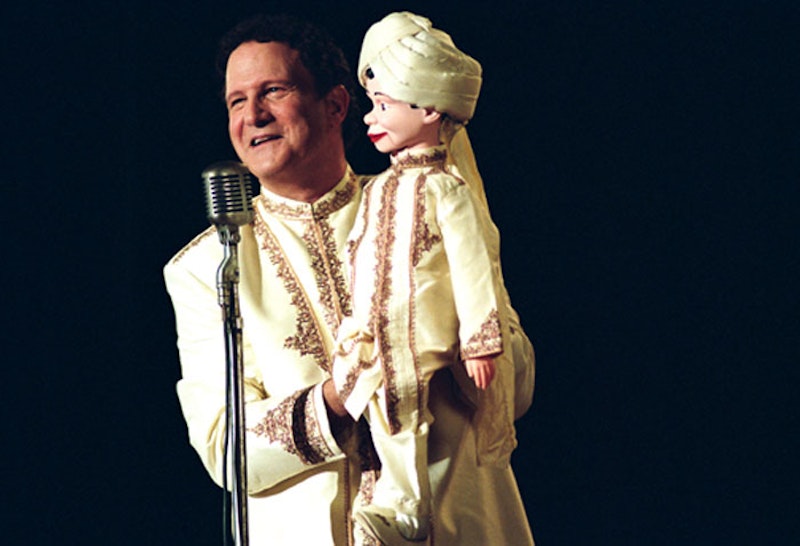At the start of a SAG-AFTRA strike that, just a few weeks ago, no one thought was possible, I found myself in the middle of an Albert Brooks binge. Although he’s directed, co-written, and starred in six films of his own, Brooks is likely most recognized today as the voice of Marlin in Finding Nemo and its 2016 sequel, Finding Dory. Before that, his red-letter appearances were in Martin Scorsese’s Taxi Driver, alongside Cybill Shepherd, and the neurotic and middling newscaster Aaron Altman in Broadcast News, one of three collaborations with James L. Brooks—no relation. But Brooks did put his real brother, Bob Einstein, in his second feature, Modern Romance, in a masterful scene of exercise upselling.
Einstein, once known as Super Dave Osbourne, is still remembered today four-and-a-half-years after his death, as Marty Funkhouser, Larry David’s friend in Curb Your Enthusiasm, a vituperative man and the opposite of his dry ice delivery as the jogging salesman who delivers an immortal 12-word response to Brooks’ insistence that he doesn’t need multiple tracksuits. He’ll take the velour digs over the prefab jogging box, but when the suit’s in the wash, he won’t run. Cut to a medium close-up of Einstein, shrugging: “I misjudged you. I’m not perfect. Buy the box, you’ll like it.”
To a lot of people, this probably sounds like a breathless recap of the cocaine bit in Annie Hall, as if no one has seen Modern Romance or any Albert Brooks films in 2023. He was a major blind spot for me, an actor that rubbed me the wrong way in Broadcast News, a movie I didn’t like on first viewing because of its garbled and naive politics and media critique. Brooks has only directed seven movies since 1979; unlike Woody Allen, he wasn’t a constant presence in the media or on movie screens. And as he told Howard Stern in 1994, “I’ve saved enough money that I don’t have to be at the mercy of Hollywood.” Unlike Allen, who set up multi-picture deals with studios like United Artists, Orion, and Amazon that kept him financed for years, Brooks took years in between films, co-writing all of them with Monica Johnson (his most recent, 2005’s Comedy in the Muslim World, was his first solo writing/directing gig).
This particular Hollywood precariousness, ironically, is the subject of almost all of Brooks’ films, unlike Allen. I’m sure if my parents liked Albert more than Woody, I might feel differently, but what’s remarkable about discovering Albert Brooks now is how much more off-putting and irritating he is in comparison. Brooks is uglier and less charismatic than Allen, who’s always had style—Brooks has a craggy, anonymous face like Craig Wasson, a beadier-eyed Steve Gutenberg, an actor who looks more like a studio executive. None of this is negative, and it’s what makes his films so special and thrilling: who else could write, direct, and star in a movie about a man moving back in with his mother just to berate her about his problems with women and why she’s to blame? Incidentally, 1996’s Mother is Brooks’ biggest hit, making $19 million with Debbie Reynolds co-starring (Nancy Reagan loved the script and almost did it).
Brooks’ comedy is mean-spirited, self-centered, self-loathing, and so repulsively neurotic that it immediately subverts audience expectations and undermines traditional film grammar. Like James L. Brooks, who makes masterpieces out of greeting cards and disturbing personal fixations, Albert Brooks’ comedies alternately rush rewards and stymie satisfaction: the ending of Mother is particularly hilarious, when he meets his soulmate at a gas station minutes after “solving” his problems with his mom; but also what much of that film has in common with Modern Romance: relatively long, no frills, “real time” scenes of Brooks alone or talking with one other person. Never very dramatic, yet always afloat; his jokes hit faster and harder than Allen’s, who’s more of a motormouth and much more of a humanist.
Despite living a life of relative reclusion, Allen never got stuck in Hollywood. Brooks was born and raised there, and his films reflect that. He could never make a Hollywood satire as accessible and broad as The Player because he’s too specific: as Stern called him, “the comedian’s comedian.” 1999’s The Muse is a forgotten gem that’s much more “inside” than The Player or James L. Brooks’ compromised I’ll Do Anything. Just as the Palatine HQ scenes in Taxi Driver now play like a prologue to Broadcast News, James Cameron tiptoeing away while whispering “no more water… stay away from the water” after visiting The Muse Sharon Stone proves now that she really was just mentally ill.
—Follow Nicky Smith on Twitter: @nickyotissmith

